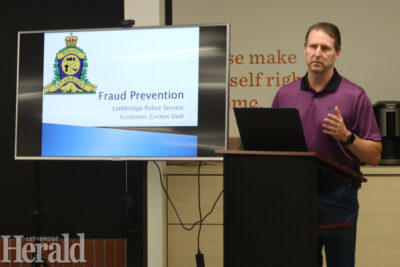Police aim to help residents avoid falling victim to scams
By Alejandra Pulido-Guzman - Lethbridge Herald on May 6, 2023.
 Herald photo by Alejandra Pulido-Guzman
Lethbridge Police Service with the Economic Crime Unit, Sergeant Kevin Talbot speaks about cyber crime prevention, during an information session at the ATB Entrepreneur Centre.
Herald photo by Alejandra Pulido-Guzman
Lethbridge Police Service with the Economic Crime Unit, Sergeant Kevin Talbot speaks about cyber crime prevention, during an information session at the ATB Entrepreneur Centre.LETHBRIDGE HERALDapulido@lethbridgeherald.com
Lethbridge Police Service Economic Crime Unit, Sergeant Kevin Talbot spoke about cyber crime during an information session at the ATB Entrepreneur Centre Thursday afternoon.
Talbot said LPS has a PowerPoint presentation they deliver on request, primarily delivered to seniors groups, because is often seniors who are targeted and become victims of frauds, but that it is a useful tool for anyone within the community.
He spoke about phishing, Canada Revenue Agency (CRA), Canada Border Services Agency (CBSA), lottery, computer fixing, grandparents and romance scams and investment frauds.
 One common warning he gave with all of them, is that if it sounds too good to be true, it is.
Talbot also repeatedly asked those in attendance to never click a link sent by a an unknown source and never give personal information out.
Talbot said people can recognize scams by paying attention to red flags like if there is a sense of urgency within the message, threads of arrest, asking for compensation through gift cards, making payments by converting your money into crypto currency, making payments over the phone or if they ask you to keep the conversation a secret.
“Phishing scams, this is a term used for scammers who are sending mass emails, text messages, or phone calls to multiple people. To hook you into parting ways with some of your personal information, access bank account information, might be accessing your account directly or getting a loan in your name, anything like that,” said Talbot.
He warned against clicking on any links received through those types of messages, as once you do, scammers gain access to your mobile device or computer and can gain access to sensitive information.
 Talbot says scammers hack social media accounts pretending to be someone who their victim actually knows
“I’m investigating a file right now where this woman is in her late 70s. She thought she was talking to her friend about a post she thought her friend made. The post was about investing in cryptocurrency and the good success she’s had, so she started a conversation with who she thought was her friend. And not just a Facebook friend but an actual personal friend she’s actually met. This individual kept on communicating with her and then forwarded her onto another person who was her investor. Long story short, she ended up investing in cryptocurrency to the tune of $200,000 and lost every penny of it,” said Talbot.
Speaking about scams involving the CRA and CBSA, one thing Talbot made clear is that they will not arrest you for taxes, they will not ask for payment for something at the border to be made over the phone, in a different currency or in order to be able to claim your package. Those fees would have been included in the shipping when you make a purchase from outside of Canada.
When it comes to Lottery scams, he said first thing people need to know is that in Canada, we do not pay taxes on lottery, so when someone calls asking you to pay taxes in order to be able to claim your prize, it is a scam.
Speaking about grandparents scams, he said if someone calls saying that someone needs bail money and a person will come to your house and pick up the money, it is a scam. He said when it comes to bail money, people are supposed to pay in person at the station and there are protocols they need to follow to keep record of the transaction.
He also said that if someone calls to let you know someone from your family has been in accident and they need money, you should take it with a grain of salt, hang up and call the supposed family member to confirm.
When speaking about computer fixing scams, Talbot warned those in attendance about clicking any pop-up warnings, as that gives access to scammers pretending to be tech support.
“Apple and Microsoft are not monitoring our computers for viruses, they don’t know when something needs to be fixed, so if a pop-up shows up in your screen don’t click it, it is not technical support. Nobody is monitoring your device for problems,” said Talbot.
He said if something seems wrong with your device, call a trusted technical support yourself, nobody is going to call you out of the blue to let you know something needs to be fixed, if they do it is a scam.
When it comes to romance scams, Talbot said those were his least favourite as they prey on people who are vulnerable and looking for companionship.
“Often the individual will promise they love you, they want to marry you, they want to come see you, but there are things that delayed because they are having issues with taxes or legal trouble and they just need some cash,” said Talbot.
He said the problems with those scams are that people who would normally see the obvious red flags of a scam, turn a blind eye to it because they are in love and often fall victims of guilt when the scammers say that if they love them they will send them money.
“In those cases, look for early professions of love from the individual, I know love at first sight can happen, but not love at first email or first text.”
Follow @APulidoHerald on Twitter
24-23




